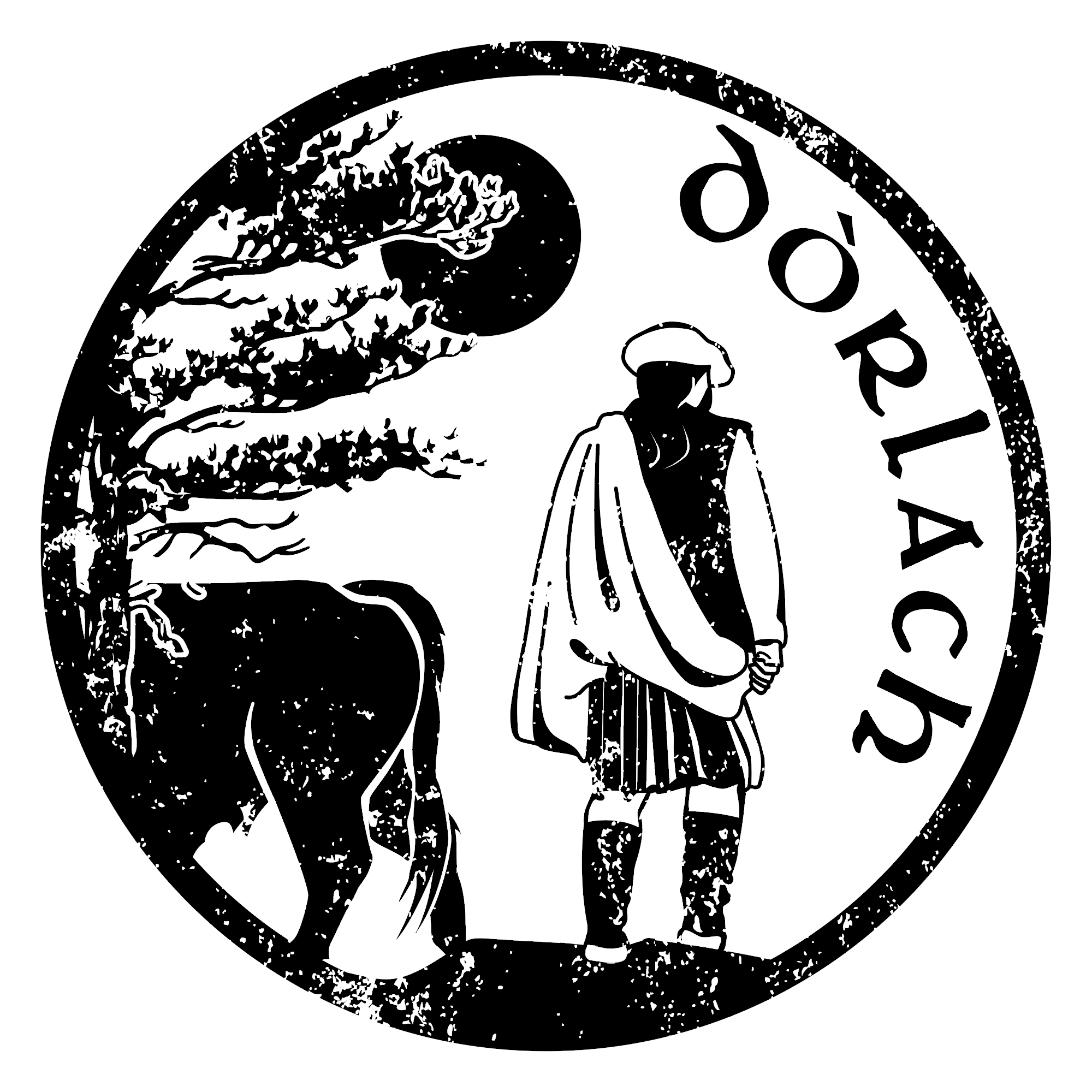On 22nd June 2023 I travelled from my current home in Elphin, Assynt, to interview two Gaelic speakers I had identified in or from the Durness area. Johnny Morrison came to a talk I gave for the North West Highlands Geopark’s Pilgrim’s Trail project the previous month and I had arranged to go back up to speak to him about various subjects. In the interim I had also been put in touch with David Morrison, who happened to be visiting home at the same time, and came to meet me in the village. I would like to thank Louise Senior of Plantlife’s Species on the Edge project for facilitating these meetings, the drivers of the Durness Bus for their logistical assistance, both interviewees for sharing their time and knowledge, and of course Johnny’s wife Joyce for the tea and first-class home-made biscuits. It has been a pleasure and a privilege to meet you all.
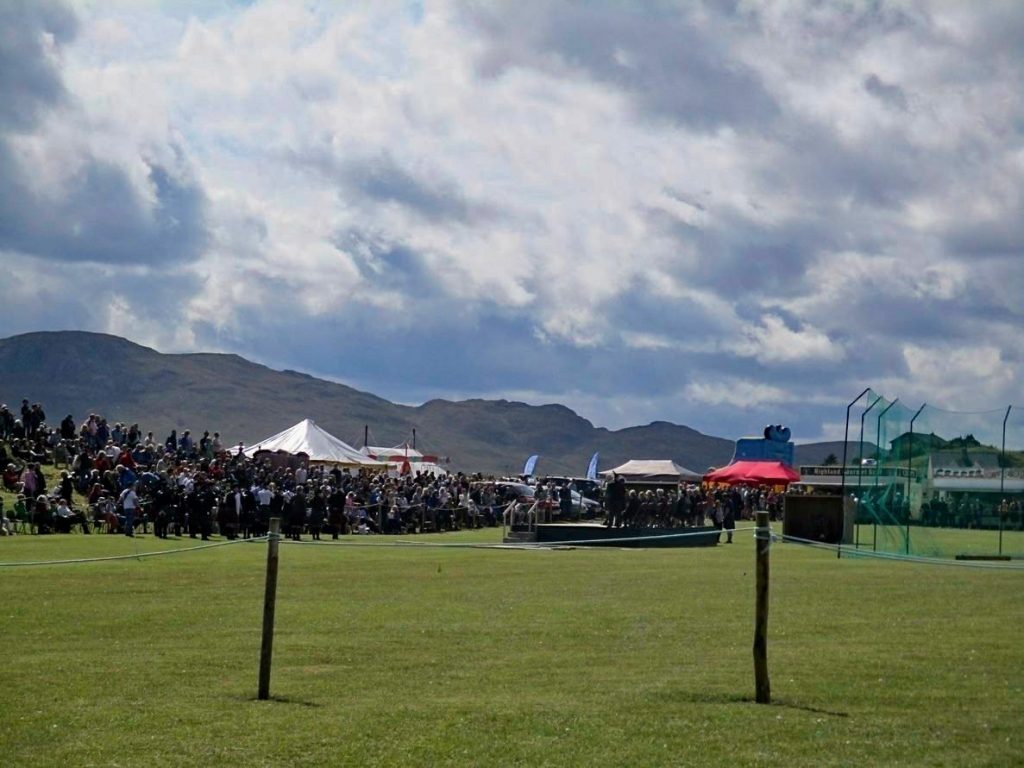
A fine day for the 2023 Durness Highland Gathering (photo by author)
David Morrison
David Morrison (Daidh aig Sheoras Daidh Sheorais Saingabheag) and his brother Willie are, to the best of his knowledge, the last two remaining native speakers of Durness Gaelic in the world – in David’s own words, ‘the last of the Mohicans’. They hail from Sangobeg, to the east of Durness, where their family have lived for several generations. David was sent to school in Dornoch when he was eleven years old, which he described as ‘a waste of a childhood’. He never lived in Durness full-time again. After studying business at Glasgow University, he founded a property company with which he had great success. Now residing in Broughty Ferry, David retains his parents’ house in Sangobeg, and another in Kinlochbervie, he says for the sake of his children, as ‘it’s important to know where you come from’. He still visits home about once a month, and makes sure to go cèilidh-ing when he does, checking in with his friends and relatives in the area. We met in the garden of his son’s house in Durness.

David Morrison (far right, kilted) presiding over the 2023 Durness Highland Gathering (photo by author)
David was not sure of many of the answers to the questionnaire, as he says he so rarely speaks Gaelic these days that he cannot remember a lot of the vocabulary it was looking for, but he did have some more general points to make. Like most of the folk of his generation I have spoken with, he had little positive to say about his schooling, telling me that they were taught that Gaelic was of the past and would only hold them back in life. He has been active in preserving the Reay dialect himself, publishing a pamphlet edition of Adam Gunn’s ‘The Dialect of the Reay Country Bard’ in 2011. As he writes in his introduction:
As this ancient dialect, which has withstood the vicissitudes of neglect, outright hostility and a drastic diminution of the native population through clearances, is now close to extinction, with few if any young speakers of the dialect, it is even more necessary that this little book is published, to show Gaelic speakers of future generations how we spoke. The final decline has been relatively quick. Fifty years ago, the preferred means of communication by the inhabitants of the villages of the north coast was Gaelic; a rich a mellifluous language capable of the greatest subtlety of meaning and expression. But the insiduous propaganda of the Establishment, and its anti-Gaelic Great Lie, was sadly swallowed only too well by the local people, who refused to speak to their children in Gaelic in the mistaken belief that it would ‘keep them back’ in the world outside!
…the Gaelic dialect spoken from Kylesku in the west to Melvich in the east and all through Strathnaver, is unlikely to be the Gaelic dialect spoken by our forefathers, but one of the dialects of the Western Isles; no bad thing, but not our own.
Questionnaire answers
- brand new – ùr
- odd, weird, strange – eibhinn
- clumsy – spàgach
(casan spàgach – clumsy person) - rabbit – coinean
- crow – feannag
- finger names – (there was a mnemonic verse but he can’t remember)
- stone – clach
- blue, green – gorm, uaine for grass
- smoke – ceò
- fireplace – teine
- peat – mòine
(stòrag – a stack of six peat bricks)
(astrag [sp.?] – a stack of 18 peat bricks) - sleet – flochan-sneachd
(the above spelling is phonetic – he says in Durness it is floch rather than fliuch) - bee – tìlleag
- thistle – foghnan na h-Alba
- ghost – tathasg
- bogle – spiurd/spioard an uilc
(his grandmother used to call him this when he was wee!) - how are you? – cianas tha thu?
- thank you – móran taing
- reside/live – fuireach
Any other thoughts?
- Reay Gaelic tends to clip the end off words, e.g. ruigh’ for ruighe, etc.
- Vowels are pronounced differently, tending towards ‘a’-sounds, e.g. chan al for chan eil, a-stay for a-staigh, ainmal for ainmeil, etc.
- Instead of suas/sios, in Durness they use àrd/a-bhàn.
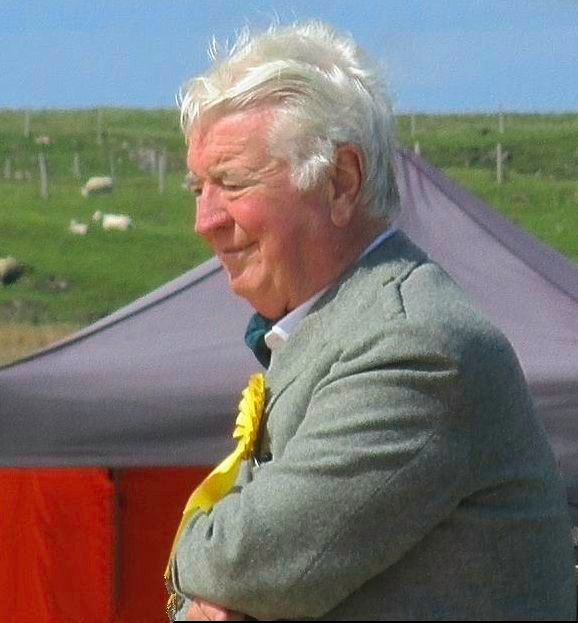
David at the Games (photo by author)
Johnny Morrison
Johnny was born in 1933 in Ardvourlie (Aird a’ Mhulaidh), Harris, a settlement just north of Tarbert in the shadow of Clisham. Unusually for a Gael of his generation, he can read and write in Gaelic – entirely self-taught from books. Johnny also had an appalling experience of school and feels that the education system failed them. He told me that on Harris they had a wonderful teacher for the first two years of infant school who taught them everything, but then she married and had to leave. Her replacement apparently gave them no education whatsoever, telling them simply to ‘get on with their writing’ and spending her days knitting instead. To win a bursary to attend Tarbert Junior Secondary School they had to sit an exam; all five pupils from his year group submitted a blank exam paper and failed. He left school with no qualifications, and spent ten years working in estate management for Iain Mackenzie in Harris.
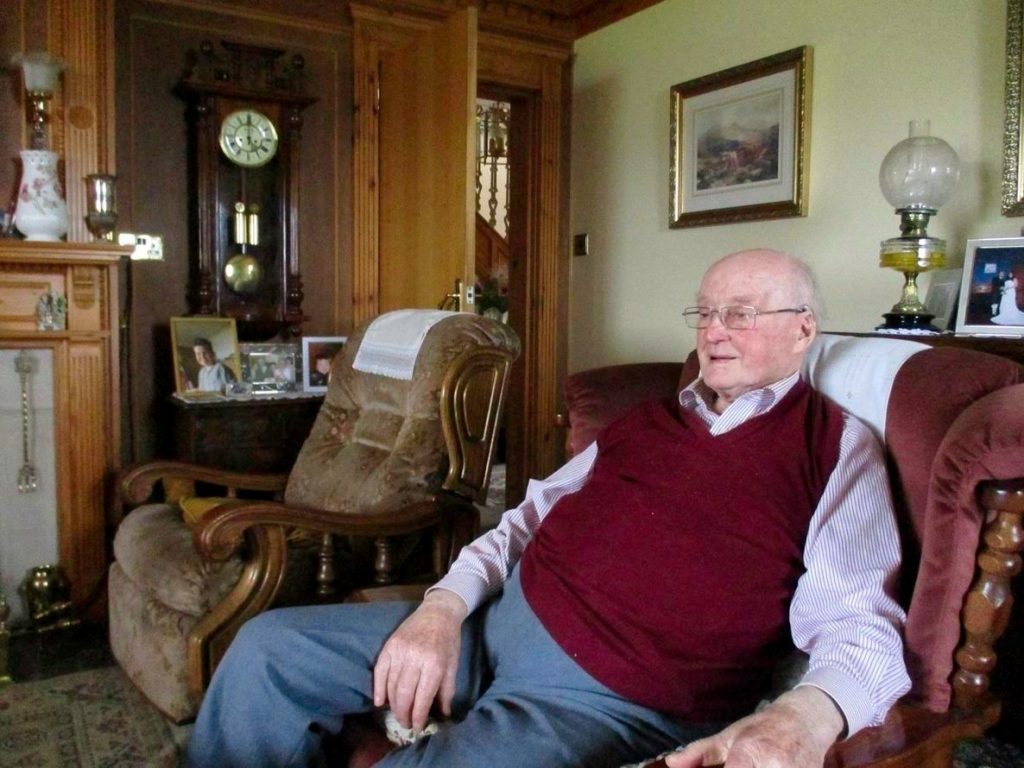
Johnny Morrison (90) at home in Sangobeg (photo by author)
In 1962 he moved to Durness to take up a job in hotel maintenance. It was here he met his wife Joyce. As he tells it, he ‘found this woman at the roadside, cutting peats with her father.’ Joyce’s father was a blacksmith who retrained as a forester after demand for his original trade dwindled when folk in Durness stopped keeping horses. Johnny discovered he had a natural talent for woodworking, and subsequently had a long career as a joiner and house-builder, working all over the Highlands. He built the house he and Joyce still live in Sangobeg himself, from the foundations to the impressive wood panelling of the interior.
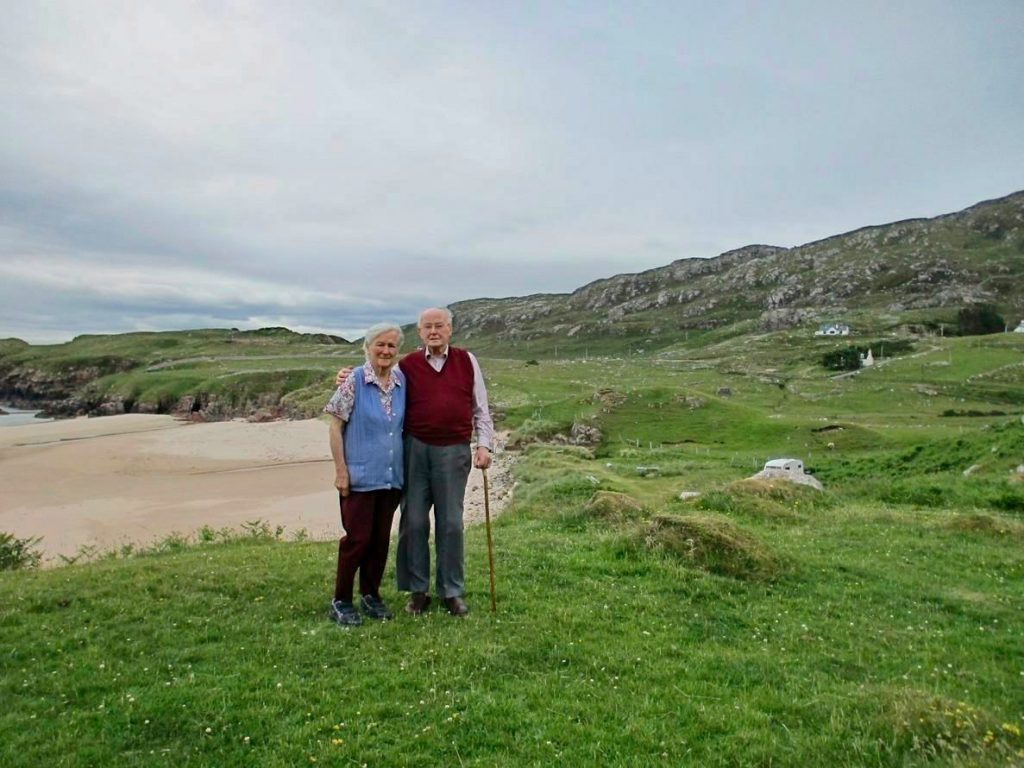
Joyce and Johnny Morrison, out the front of their house in Sangobeg (photo by author)
Johnny loves Durness dearly, and says that he was made to feel entirely welcome from the minute he arrived in the village, which he attributes to the Gaelic language and culture he and the native people there shared. To him, Durness Gaelic is very similar to Harris Gaelic, and he says he never felt like an outsider. When I suggested that he must have seen a lot of things change in Durness in the sixty years he’d lived there, he thought about it for a minute and answered, ‘no, not really’ – he says that he sees the same spirit of community and care for one another in the young folk growing up there today. (1) He says that Durness folk have a history of welcoming incomers, from people coming to work at the nearby MOD facilities, to those who settled at Balnakiel Craft Village in the 1960s, to more recent newcomers to the village, which has maintained the vibrancy of the community. He did tell me that Gaelic was already on its way out as a community language by the end of the 1960s, with only really the older generation using it as their everyday tongue. The last person he regularly spoke Gaelic to was his sister in Harris, and like David he had no memory of much of the vocabulary requested by the questionnaire. I asked Johnny what the word dùthchas meant to him, and he replied, ‘well, it’s the old way of doing things… it’s your ancestry’. I visited Johnny and Joyce at their home in Sangobeg.
Questionnaire answers
- stubborn – rag
- odd, weird, strange – amasach (event)
neònach (person) - clumsy – tubaisteach
- frustrating – mialach
- scarecrow – bodach-starraig
- crow – starrag
- neck, throat – amhaich (neck)
sgòrnan (throat) - stone – clach
- blue, green – liath (blue)
uaine (green) - smoke – ceò
- fireplace – àite-teine
- peat – mòine
- sleet – sneachda-mìn
- nettle – dionntag
- starfish – iasg-rionnag
- how are you? – ciamar a tha u/sibh?
- thank you – tapadh leibh
- perhaps, maybe – ‘s dòcha/faodaidh a bhith
- reside, live – fuireach
Any other thoughts?
- Johnny has a particular distaste for the way the place-name Glen Golly has become mangled over time. I was interested to hear his verdict as I have looked into this name myself and found the available onomastic interpretations highly un-satisfactory. Johnny says it only makes sense in the context of the line Rob Donn’s song, which he says is Gleann Goibhle nan Craobh – essentially ‘the glen of the crotch of trees’, which for anyone who has been there is thoroughly apt. The gleannan of which Rob Donn sang is indeed a little wooded crevice nestled among the bare rocky hills west of Gobernuisgach, and it looks as though this is yet another Gaelic place-name obscured by Anglophone Victorian prudery. Johnny has a great appreciation of Gaelic poetry and says there is a warmth and range of expression in it that he does not find in English poetry.
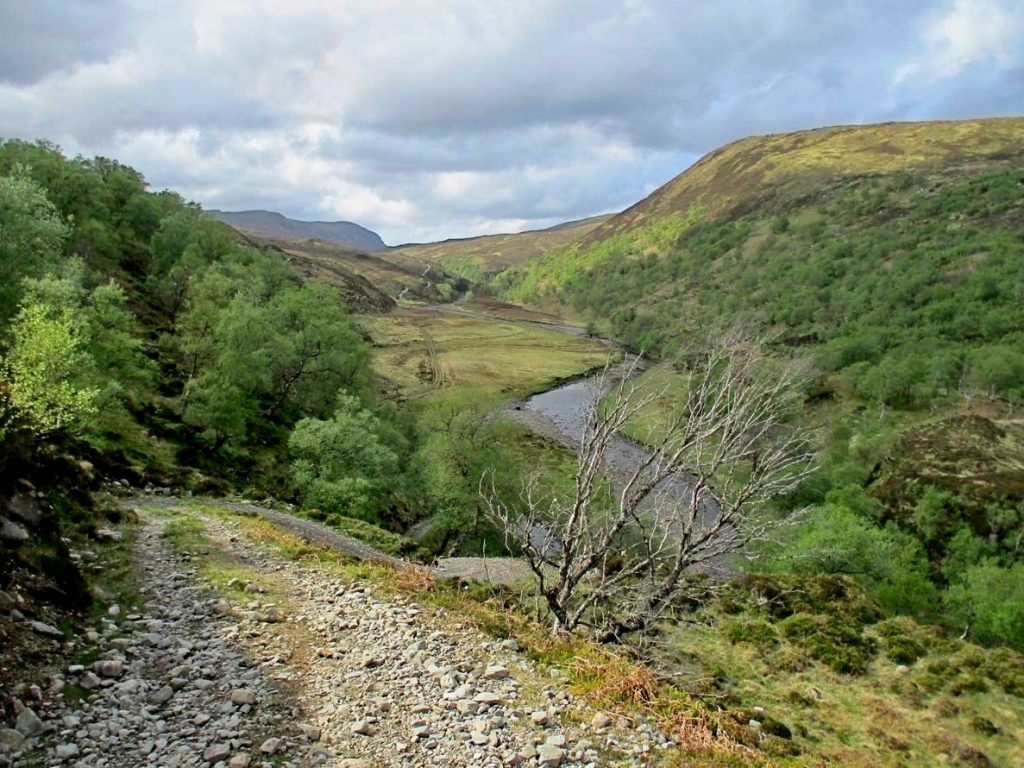
Glen Golly, or Gleann Goibhle nan Craobh (photo by author)
(1) During my last two visits to Durness, I asked a few older people what they has seen change in Durness over their lives, and the answer was invariably, ‘not much’! Although the wider region has greatly opened up to tourism over the last decade or so, it appears that the strong sense of community here has remained much the same, which is evidenced by the relatively high number of young people who still choose to stay and make a life in Durness, compared to some other nearby villages.
